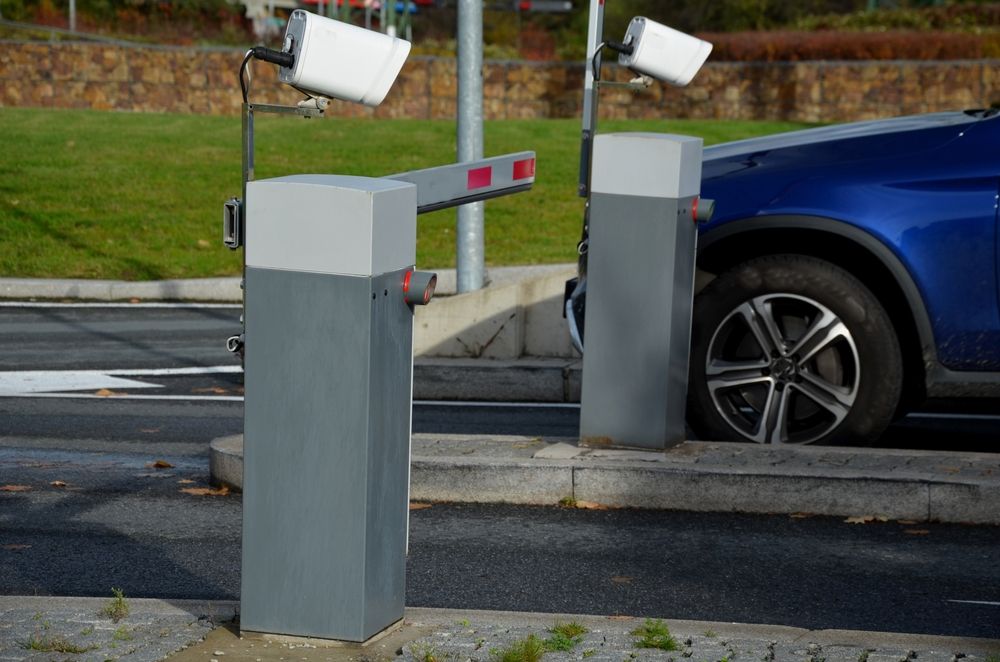How Technology is Transforming Toll Management for Trucking Fleets

The trucking industry has seen remarkable changes thanks to advancements in technology, with toll payments being one of the many aspects undergoing transformation. The days of carrying cash to pay for tolls across states are long gone. Modern systems now allow seamless toll payments through high-speed toll gantries, reducing stops and enhancing fleet efficiency.
Open-road tolling technologies have evolved primarily into two categories: RFID (Radio Frequency Identification) and toll-by-plate systems. In this article, we’ll explore both and understand the benefits and drawbacks of each one.
Overview of RFID Technology in Trucking Fleets
RFID (Radio Frequency Identification) technology has emerged as the preferred choice for trucking fleets, offering precision, efficiency, and a significant reduction in administrative burdens. Here’s a closer look at how RFID works and its benefits:
How RFID Technology Works:
-
Transponder Devices: Vehicles are equipped with transponder devices, which are small, typically windshield-mounted units.
-
Wireless Communication: These transponders communicate wirelessly with RFID readers installed at tolling stations.
-
Transaction Processing: As a truck passes through a toll gantry, the RFID reader detects the transponder, processes the transaction, and applies the toll fee directly to the carrier’s account within seconds.
Advantages of RFID Systems:
-
Simplifies Travel:
-
Eliminates the need for vehicles to stop or slow down at toll booths.
-
Allows drivers to maintain steady travel speeds, avoiding unnecessary delays.
-
Particularly beneficial for fleets with tight schedules or time-sensitive deliveries, resulting in significant time savings over the year.
-
-
Long-Term Cost Savings:
-
Although the initial cost of purchasing and installing RFID transponders can be high, the long-term benefits often outweigh this expense.
-
Many tolling authorities offer built-in discounts for RFID users, reducing overall toll expenses.
-
Savings can accumulate to thousands of dollars for fleets with high toll usage, thanks to percentage-based discounts compared to traditional toll-by-plate or cash payments.
-
-
Reduced Errors:
-
RFID systems significantly lower the risk of errors that are common with manual or toll-by-plate systems.
-
Misreads, duplicate charges, and billing disputes are far less frequent, ensuring accurate and transparent billing.
-
This accuracy minimizes administrative efforts for fleet managers and fosters trust in the billing process.
-
Strategic Investment for Growth:
-
For many carriers, especially those with larger fleets or extensive toll road usage, investing in RFID technology is a strategic decision.
-
RFID provides a reliable, efficient, and cost-effective solution that supports long-term growth and operational efficiency.
-
Integration with advanced toll management platforms allows carriers to analyze toll spending, optimize routes, and enhance savings further.
RFID technology offers trucking fleets a robust solution that enhances operational efficiency, reduces costs, and improves the overall tolling experience. Its ability to streamline transactions and minimize errors makes it a valuable investment for carriers looking to optimize their operations.
Overview of Toll-by-Plate Systems
Toll-by-plate systems provide an alternative to RFID-based tolling by utilizing advanced camera technology to capture a vehicle's license plate as it passes through a toll gantry. Here’s how they work and their implications:
How Toll-by-Plate Systems Work:
- License Plate Capture: High-resolution cameras photograph the vehicle’s license plate as it approaches the toll gantry.
- Optical Character Recognition (OCR): The system uses OCR technology to read the plate number and identify the associated account.
- Invoice Generation: If no pre-existing account is linked to the plate, an invoice is mailed to the vehicle owner for manual payment.
Advantages of Toll-by-Plate Systems:
- Simplicity:
- No need for additional hardware or devices.
- Vehicles can operate without purchasing and installing transponders.
- Cost-Effective for Smaller Operators:
- Ideal for smaller carriers or independent owner-operators who may not have the budget or frequency of toll usage to justify RFID investments.
Disadvantages of Toll-by-Plate Systems:
- Higher Toll Rates:
- Plate-based transactions often incur higher toll rates compared to RFID users.
- Additional administrative fees cover costs for manual processing, invoicing, and mailing.
- Over time, these higher rates can significantly increase operating expenses, especially for fleets frequently using toll roads.
- Increased Risk of Billing Errors:
- Plate misreads can occur due to dirt, damage, or poor lighting conditions.
- Errors may lead to invoices being sent to the wrong party or duplicate charges.
- Resolving these disputes often requires manual intervention, adding to the administrative burden for fleet operators.
- Delays in Billing Process:
- Reliance on mailed invoices can slow down the billing process.
- Manual payment processing may result in late fees or penalties if invoices are not addressed promptly.
- These inefficiencies can negatively impact profitability, especially for carriers operating on tight margins.
Practical Use Cases:
Despite the drawbacks, toll-by-plate systems can be practical for specific scenarios:
- Infrequent Toll Users:
- Ideal for fleets that operate occasionally in toll-heavy regions.
- Budget-Conscious Carriers:
- Smaller carriers with limited budgets may prefer the ease of use and lack of initial setup requirements.
- Improving Systems:
- Some tolling authorities are enhancing their plate-based systems to reduce errors and expedite billing, making it a more viable option for certain segments of the industry.
While toll-by-plate systems offer a convenient and cost-effective solution for some carriers, they come with challenges that need to be carefully considered, particularly regarding costs and billing accuracy.
Challenges with Modern Tolling
Modern tolling systems, while technologically advanced, still present significant billing challenges for drivers and, especially, large fleets. Beyond simple misreadings leading to duplicate charges (e.g., transponder and license plate billing), complexities arise from:
Vehicle Configuration Issues: Accurate billing for articulated vehicles (trucks with trailers) remains a persistent problem. Discrepancies often occur between charges levied against the tractor unit and the trailer, leading to fragmented invoices and difficulty in reconciling costs. This is exacerbated by variations in vehicle configurations and the inconsistent application of tolling rates based on axle count or vehicle length.
System Integration Problems: Interoperability between different tolling systems across regions or even within a single state can be poor. This results in fragmented billing data, making it difficult to track expenses and identify errors. Data discrepancies between different systems make comprehensive reporting and auditing a major headache.
Data Accuracy and Validation: The reliance on automated systems, while efficient in theory, introduces vulnerabilities. Errors in image recognition, transponder malfunctions, or even temporary communication outages can all lead to inaccurate billing. Validating the accuracy of each transaction manually is often impractical given the sheer volume involved.
Resolution Processes: Dispute resolution often proves slow and cumbersome. Contacting tolling authorities, providing evidence, and negotiating corrections can be a lengthy process, particularly for fleets managing numerous vehicles and transactions. The lack of standardized dispute resolution procedures across jurisdictions adds another layer of complexity.
Technological Dependence: The entire system's reliance on technology creates a single point of failure. System-wide outages or cyberattacks can disrupt billing processes, leading to widespread delays and inaccuracies.
These challenges translate into significant costs for fleets in terms of time spent on administrative tasks, financial reconciliation efforts, and potential penalties for late or inaccurate payments. Improved data management, better system integration, and more streamlined dispute resolution processes are crucial for enhancing the efficiency and accuracy of modern tolling systems.
The Role of Toll Management Systems
Toll management solutions simplify this process, offering fleets a centralized platform for handling toll payments and disputes. By consolidating toll transactions into unified reports, these systems eliminate the need to juggle multiple accounts from various tolling authorities. They also provide valuable insights into fleet performance, enabling companies to optimize routes and reduce costs.
A prime example of toll management's effectiveness comes from Service Trucking Inc., a family-owned carrier based in Florida. Before adopting a streamlined toll management system, the company faced recurring toll violations and hefty administrative burdens. After integrating a comprehensive solution, they reduced violations by 80%, dropped late-night administrative tasks, and saved thousands of dollars monthly on fines. The company also benefited from advanced reporting tools, allowing them to redesign routes and improve fleet performance.
Choosing the Right Tolling Solution
When selecting a tolling solution, it is essential to consider factors such as fleet size, operating regions, and toll frequency. For instance, carriers with substantial activity in specific states might benefit from state-specific discounts offered by toll management providers. Moreover, solutions like RFID systems often come with additional cost-saving benefits such as volume rebates, helping fleets save significantly on high-cost toll roads.
Ready to Simplify Your Toll Management?
Managing toll expenses doesn’t have to be complicated. Bestpass provides a comprehensive solution tailored for trucking fleets of all sizes, offering consolidated billing, advanced analytics, and nationwide toll coverage. Discover how Bestpass can help your fleet streamline operations and reduce costs. Learn more by calling 888.410.9696 today.

